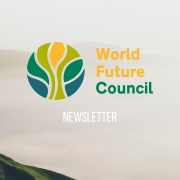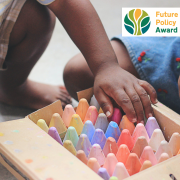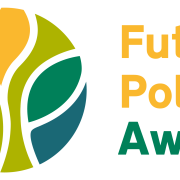Legal accountability for the impacts of climate change?
Legal accountability for the impacts of climate change?
How Vanuatu and the younger generation are pushing climate justice into the forefront
Lena Dente, Senior Programme Manager, Energy and Just Development
Climate change is arguably one of the biggest challenges of our time, and its impacts are felt disproportionately by vulnerable communities around the world. Climate justice seeks to address this imbalance by ensuring that those who have contributed the least to the climate crisis are not unfairly burdened with the consequences.
One country at the forefront of the climate justice movement is Vanuatu, a small island nation in the South Pacific. According to data from the United Nations Framework Convention on Climate Change (UNFCCC), Vanuatu’s greenhouse gas emissions in 2015 were only 0.002% of the world total. However, the country is one of the most vulnerable to the impacts of climate change, with rising sea levels, more frequent and severe tropical cyclones, and ocean acidification threatening its very existence. The 2020 Climate Risk Index by Germanwatch ranked Vanuatu as the fourth-most affected country by climate change over the past two decades, with an estimated 2,341 deaths and economic losses of $477 million.
Taking Action
In 2018, Vanuatu launched the Vanuatu ICJ Initiative, which called on the International Court of Justice (ICJ) to provide an Advisory Opinion (ICJAO) on the responsibility of states to prevent climate change and the impacts on the rights of people beyond national jurisdiction. On 29th March 2023, the United Nations General Assembly will vote on this issue.
The Initiative is spearheaded by Vanuatu on behalf of a coalition of over 120 nations including Pacific Island nations, which are also among the most vulnerable. This campaign led to the formation of the organization, World´s Youth for Climate Justice, which represents the voice of future generations in this important issue.
The Vanuatu ICJ Initiative argues that climate change is a threat to the fundamental human rights of people around the world, and that states have a legal obligation to take action to prevent it. The Initiative calls on the ICJ to clarify the legal obligations of states under international law, including the duty to prevent harm and the principle of common but differentiated responsibilities.
In addition to the rights of people currently affected by climate change, the Initiative also highlights the importance of considering the rights of future generations – that they are not unfairly burdened by the consequences from the climate crisis and that they have a right to a safe and healthy environment. Climate change is an intergenerational issue, and is an important principle of climate justice, recognizing that present generations have a responsibility to ensure that the needs of future generations are not compromised.
Potential International Impact
The Initiative represents a landmark moment in the climate justice movement, as it highlights the urgent need for action regarding the unequal impacts of climate change. It also is a testament to the leadership of young people and small island nations in the fight against climate change.
If the ICJ issues an advisory opinion in support of the initiative, it could establish a legal precedent for holding states accountable for their actions on climate change. This could lead to stronger international cooperation and action on climate change, as well as greater recognition of the rights of vulnerable communities and future generations.
Furthermore, this could lead to greater recognition of the principles of intergenerational equity and earth trusteeship in international law and that could have implications for a range of environmental issues beyond climate change.
World Future Council Engagement
Alyn Ware, Councilor and Co-Chair, Peace and Disarmament Commission of the World Future Council serves as an advisor to young leaders and lawyers working on the ICJAO. Alyn has been engaged in several ICJAO campaigns over the years. One of the founding Councilors of the World Future Council, H.E. Judge C.G. Weeramantry, Former Vice-President of the International Court of Justice, wrote a celebrated dissenting opinion in a case related to nuclear weapons, which may serve as a precedence that will inform this new effort at an ICJAO on climate change.
The World Future Council will continue its support for this Initiative building on its contributions in the areas of just development, the rights of future generations and highlighting future-just policies.
The 13th IRENA General Assembly
The 13th IRENA General Assembly
The World Future Council´s Energy and Just Development Team took part in the 13th IRENA Assembly in January 2023. The focus this year was “World Energy Transition – The Global Stocktake”. In contrast to the COP meetings where the energy transition is a part of the climate change discussion, the IRENA General Assembly is focused more directly on renewable energy and the energy transition.
The event brought together stakeholders from across the energy sector and across the globe to focus on elements of the transition such as gender inclusion, just development, energy access, and climate finance. Discussions ranged from the global policy level to more local solutions and challenges with global implications, such as were discussed within the context of Small Island Developing States.
The potential for gender inclusion and the framework and policies needed for a just transition in the energy sector were discussed in a plenary debate session. Upskilling, job development, and community development opportunities were just a few of the positive actions that will help move the energy transition toward being a just transition.
Obviously, ensuring that nobody is left behind in the energy transition is going to depend on climate finance. The IRENA discussions included important debates regarding the facilities, private and public funding, and investing vs lending as key topics. Importantly, the general consensus seemed to agree that the energy transition is coupled intrinsically to development, which is an important aspect ensuring a just transition for all.
Lastly, the World Future Council will continue to be part of the IRENA Coalition for Action. Lena Dente was elected to represent the WFC on the Steering Committee. This Coalition works in collaboration with other energy transition organizations from across the globe to advise IRENA and to help shape the public dialogue on renewable energy.
Picture of Rabia Ferroukhi, Director, Knowledge, Policy and Finance Centre, IRENA
First stakeholders’ workshop on “Scaling up Agroecology in the Himalayas”
First stakeholders’ workshop on “Scaling up Agroecology in the Himalayas”
Background
The urgent need to transform our food systems is now widely acknowledged. Climate change, hunger, malnutrition, biodiversity loss and human rights violations are just a few of the challenges that are strongly connected to the way we produce, trade, and consume our food. Agroecology has been globally identified as a key transition pathway that can more holistically address the multifaceted crises we face.
To promote this transition pathway and the food systems approach, IFOAM – Organics International and the World Future Council organized a virtual workshop on “Scaling up agroecology in the Himalayas”. The interactive workshop brought together stakeholders from Bhutan, India and Nepal to discuss the fundamental steps needed to achieve sustainable food systems through agroecology in the Himalayas. Participants exchanged on the current situation of food systems and agroecology in the Himalayas, reflected on the main challenges and opportunities for positive change, explored available policy solutions that support sustainable and healthy agri-food systems, and discussed their potential improvements as well as ideas about additional policy initiatives.
Organizers and supporters
The workshop was organized by the World Future Council and IFOAM-Organics International and was supported by the Deutsche Gesellschaft für Internationale Zusammenarbeit (GIZ) GmbH on behalf of the German Federal Ministry for Economic Cooperation and Development (BMZ)
.
Summary
The lively and engaging two-day workshop took place online on March 14-15, 2023, bringing together 60-70 stakeholders from Bhutan, India and Nepal. Attendees included policymakers, parliamentarians, academia, civil society organizations, private sector representatives and donors.
The first day was dedicated to discussing the main challenges and opportunities of scaling up agroecology in Bhutan, India and Nepal. Sessions were structured around the food systems approach and included an overarching panel discussion and four breakout groups. The breakout sessions covered a range of topics, including resilient, inclusive, and diverse food production systems, sustainability along all food value chains, sustainable and healthy diets, as well as coordination and integration for more policy coherence and consistency.
On the second day, participants built on the discussions from day one and focused on policy dimensions of sustainable food systems, again through panel discussion and breakout groups. They identified and discussed policy solutions that support and hinder sustainable and healthy agri-food systems, discussed policy improvements, exchanged on existing policy gaps and reflected on how policy coherence and consistency could be improved.
Why was this event held? What was the aim? Over the last 10 years, Bhutanese, Indian and Nepalese policymakers have increasingly recognized the need for transition towards sustainable agricultural systems to preserve their natural resources and improve livelihoods for their rural populations. Political commitment has been implemented with varying degrees of intensity, including policies and programs with specific budget earmarks for measures supporting organic farming and agroecology. Recently also other parts of food systems, such as value chains and markets, have received more attention from policymakers. To build on this momentum and to explore how to better scale up agroecological food systems, we organized this two-day interactive stakeholder workshop. The event brought together food system stakeholders from diverse backgrounds, who share a common understanding of the need for change. We created a platform, through which we can collaborate and find innovative solutions to accelerate the transition towards more sustainable food systems based on agroecology. The workshop is part of the project “Scaling up Agroecology in the Himalayas”, which aims to draft a common roadmap and which builds on the digital event “Scaling up Agroecology in the Himalayas Together” held in April 2021 (More information at: https://www.ifoam.bio/news/high-level-policy-experts-discussed-current-situation) as well as on the study “The Mainstreaming of Organic Agriculture And Agroecology in the Himalaya Region” (Available at: https://old.worldfuturecouncil.org/the-mainstreaming-of-organic-agriculture-and-agroecology/). Will there be more such events to come in the future? This workshop is just the first in a series of stakeholder events that will conclude by the end of 2023 with a common roadmap. By scaling up agroecology in the Himalayas, we can create a blueprint for sustainable food systems that can be replicated in other regions around the world. Moreover, this is a crucial step towards ensuring our common future on this planet, acting upon the fact that the health of our ecosystems and the well-being of all living beings are intimately interconnected.
Major takeaways


World Future Forum / 15th Annual General Meeting
Shared Humanity – The Future We Want – This was the working title of the 15th Annual General Assembly of the World Future Council, which took place from 28 to 29 August. For two days, the Council exchanged views on the pressing problems of the world, the dissemination of good policies and the work programme of the World Future Council for the next years. Thanks to everyone for their active participation and great inputs. We look forward to the next Assembly!
Pontresina Declaration: The Future for Life on Earth
The World Future Council met for its 15th Annual General Meeting at Pontresina, Switzerland, on 28-29 August 2022. Surrounded by the Alps, forests and melting glaciers, we met to identify solutions to secure our common future. We received a warm welcome from the local community and the World Ethic Forum.
The World Future Council highlighted the importance of civil society and the need to protect and strengthen democracy. The Council urges the UN system and the international community to step up efforts to secure the universal right of all life to a clean, healthy and sustainable environment. Each year we have seen this effort become more urgently needed in view of growing pressures on nature, democracies, societies and economies from ecological devastation, extreme weather events, pandemics, armed conflicts, pervasive poverty and deprivation, alienation, violence, trauma and depression. Living through collapse, we are committed to regenerate our future.
The World Future Council calls on public and private sectors, and civil society to:
Regenerate ecosystems and livelihoods
- Make peace with nature in our political, legal and economic systems;
- Protect the rights and enable the work of civil society actors and Earth defenders;
- Deliver on commitments to protect, restore and regenerate ecosystems;
- Recognize, reward and promote the regenerative practices of local and indigenous communities for their sustainable resource use on their ecosystems;
- Prevent future zoonotic diseases by reversing wildlife habitat loss;
- Adopt 100 percent agroecology and regenerative food systems to protect the earth, combat hunger and malnutrition, and to help eradicate poverty; and
- Regenerate our oceans, while protecting at least 30 percent of the world’s oceans as highly or fully protected areas by 2030 and ensure the remaining 70 percent are sustainably managed by 2050, respecting indigenous fishing communities.
Stabilize the climate
- Address the food-water-energy nexus through promoting regenerative land use systems and fairly compensating farmers and Indigenous forest keepers for sequestering greenhouse gas emissions and mitigating climate change;
- End financial support for fossil fuels (subsidies and investments), uphold a fossil fuel non-proliferation treaty and cut greenhouse gas emissions at least in half by 2030;
- Fully implement the existing commitments on climate finance, incentives and low-carbon technology transfer for developing countries, especially those countries which are climate vulnerable, including Small Island States; and
- Strengthen legal protection of current and future generations of life on Earth for a sustainable climate and environment.
Transform economics and economies
- Pioneer practical pathways for transforming our economic systems towards wellbeing of all beings;
- Reward decision-making based on longer time horizons and visions; prices should tell the ecological and social truth;
- Penalize short-term speculation and adopt alternative discounting methods to more accurately assess the costs and benefits of investments in climate protection and ecosystem regeneration;
- Anticipate and prepare for black swan events, to be prepared for high consequence and low probability risks;
- Avoid unintended consequences by assessing technology choices – notably disruptive technologies – and their impact on societies, nature and democracy;
- End inequalities, defend the basic needs and livelihoods, reward resource conservation, ecological regeneration and sustainable livelihoods;
- Factor in the true cost of ecosystem regeneration into international trade and business patterns; and
- Change company laws to ensure that corporate and economic interests adhere to human rights, social justice and environmental protection principles.
Ensure the right to health
- Treat human health, planetary health and food and nutrition as inseparable and interconnected;
- Ensure that health is a fundamental human right and an integral part of human security;
- Implement universal health coverage, allowing all people and communities to have access to quality public health services, leaving no one behind. Children, refugees, internally displaced persons, elderly and persons with disabilities are amongst the most vulnerable and deserve special attention;
- Implement the human right to live in a healthy, safe and toxic-free environment with clean air, clean water and sanitation, clean soils and the right to healthy and nutritious food; and
- Implement working environments that are gender-sensitive, well-remunerated and safe.
Make peace
- Live up to obligations under the UN Charter to refrain from the use of force, to resolve conflicts peacefully and to observe the principles of international law;
- Commit to never launching a nuclear attack, starting by adopting no-first-use agreements;
- Eliminate nuclear weapons and other weapons of mass destruction globally no later than 2045, the 100th anniversary of the United Nations;
- Shift military budgets and investments to peace and human security. Much of the $2 trillion spent annually on militaries – including all of the $100 billion spent on the nuclear arms race – could be reinvested in environmental protection, public health, renewable energies, food security and the transition to green economies; and
- Ensure gender parity in all aspects relating to peacebuilding and conflict resolution.
Deliver on the rights of children, youth and future generations
- Connect the rights of the Earth, Earth democracy and Earth economics to the rights of children, youth and future generations, and incorporate the principle of intergenerational equity;
- Ensure the meaningful participation of children and youth in decision-making;
- Ensure that youth and children are key actors and agents of transformation;
- Institutionalize champions for future generations at all levels of decision-making, including support for the establishment of a UN Envoy for Future Generations; and
- Implement transformative education for co-creating regenerative futures as part of lifelong learning.
The World Future Council (WFC) works to pass on a healthy and sustainable planet with just and peaceful societies to future generations of life on Earth. To achieve this, we continue to focus on identifying, developing, highlighting and spreading effective, future-just policies and transformative pathways to face the current challenges.
The WFC has shown that a better future is possible by recognizing 66 exemplary policies from 40 countries with our Future Policy Awards and the active advocacy of its Councillors from around the world.
We strongly believe that mistrust and pessimism can be transformed into renewed hope, cooperation and solidarity of people, leaders and policy makers to take the right transformative decisions, working together as an Earth family.
Pontresina, 29 August 2022
Welcome to the V. World Organic Forum
Welcome to the V. World Organic Forum
How can the 17 Sustainable Development Goals of the UN (SDGs) be successfully implemented in rural areas through a bottom-up movement? What building blocks do the SDGs provide for regional planning and how do we measure this? What are the opportunities and added values of organic agriculture for implementing the SDGs in regions around the world? How does the German government’s international development cooperation take up the practical localization of the 2030 Agenda?
What potential do communities of strong women, regenerative agrarian culture and new approaches to climate-friendly agriculture offer for anchoring the SDGs in everyday life on the ground?
At the V. World Organic Forum we want to discuss and work on these and many other questions together with highly renowned experts and protagonists of change from global civil society, science and politics as well as farmers from regions around the world and all interested people. We will learn about best practices, develop new approaches and inspire each other to bring the UN 2030 Agenda to the ground!
This year’s conference will again take place in a face-to-face format at Schloss Kirchberg (Kirchberg Castle) from June 27 to 30, 2022. The forum is an impulse-giving place for building a global network of SDG regions, in the North as well as in the South, in which the 17 Sustainable Development Goals are implemented and filled with life!
The conference is organised by Stiftung Haus der Bauern – Akademie Schloss Kirchberg and supported by the World Future Council.
Under the link you can find more information about the conference and register for participation.







